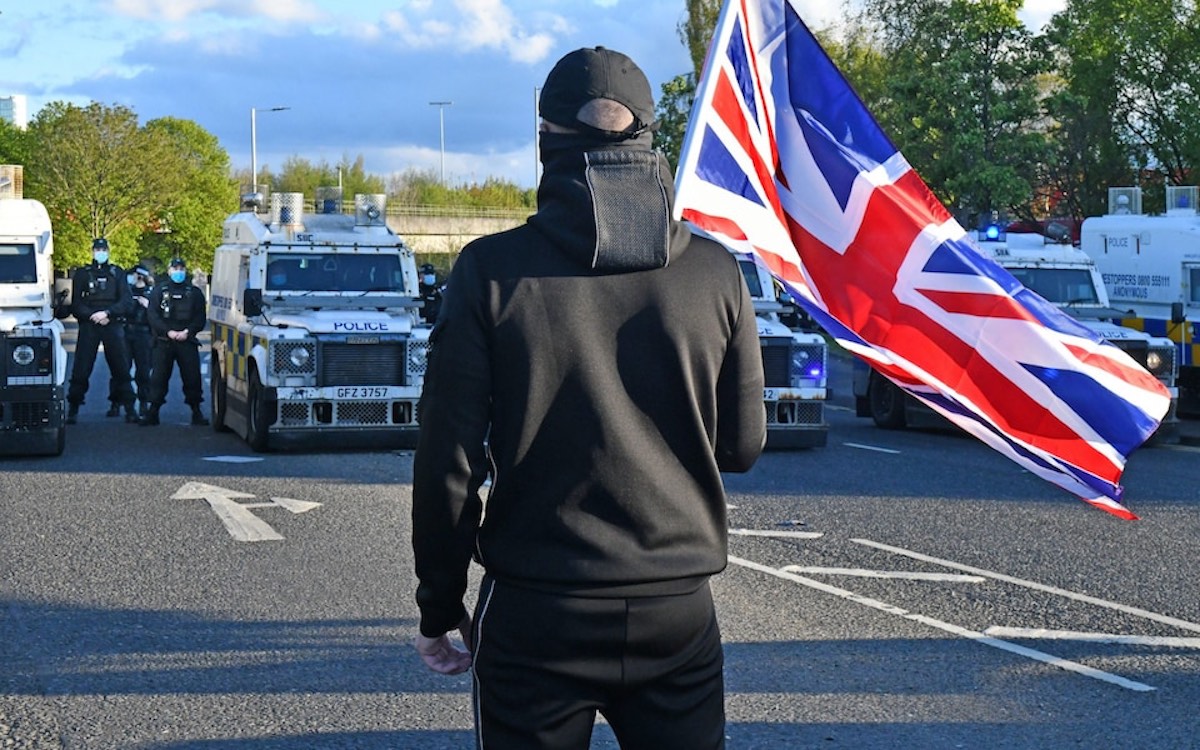
Despite mixed messages from the British government, nationalists and republicans are clear that new threats of political conflict by unionist paramilitaries cannot be allowed to succeed.
A letter was issued on Thursday of last week under the cover of the ‘Loyalist Communities Council’, but agreed by the leaderships of the main loyalist paramilitary groups, including the UDA and UVF.
It suggested a return to sectarian violence unless their demands for a hard border through Ireland and an end to ‘interference’ from Dublin are met. It also spoke of an “unprecedented reaction” and “dire consequences for the progress made from 1994 onwards”, a reference to their first ‘ceasefires’.
However, neither the UVF or UDA have ever abided by their proclaimed ceasefires, killing some 40 people since the Good Friday Agreement was signed in 1998, mostly in criminal feuds. They continue to orchestrate rioting and sectarian violence, most recently last November, and in March they mounted a hoax bomb attack against a peace event in Belfast.
The letter also warned against visits north by Dublin government politicians which it said continue to “inflame anger in loyalist communities”.
Unionist journalists were briefed by the paramilitaries that suggestions of a joint approach to ending the current political deadlock involving both Dublin and London governments was “the straw that broke the camel’s back”.
The failure of the DUP to condemn the threats further highlighted the ever-closer links between the embattled unionist party and the loyalist murder gangs.
An unexplained arson attack on a disused Orange Hall in County Tyrone on Sunday added to sectarian tensions and provided cover for further loyalist sabre-rattling by former UVF commander Billy Hutchinson, who dramatically insisted that loyalists were “angry... at the EU, the Irish government and a new generation of nationalists”.
“I implore people to please listen now before it is too late,” he declared.
But there is anger at the orchestrated move to inflame tensions ahead of an election, without a response by the authorities in either Belfast or London. Called for the revocation of the release licenses of the paramilitary figures involved, an action which has been used repeatedly against republican activists, were ignored.
Sinn Féin’s Gerry Kelly descried the development as “dangerous and despicable”.
“It is a matter of disgrace that almost 25 years after the signing of the Good Friday Agreement, that loyalist paramilitary gangs are still involved in murder, intimidation, extortion and threats,” he said.
“There is an onus on political leaders to call out this intimidation and the continued existence of armed criminal gangs in our society.”
The 26 County Minister for Foreign Affairs, Simon Coveney, who was targeted by the UVF in March, defied the gangsters.
“We are not going to be intimidated by people who do not reflect the vast majority of people’s opinion here in northern Ireland”, he said on Wednesday, following a meeting in Belfast.
“The Irish government and Irish government ministers have obligations under the Good Friday Agreement to be part of discussions here in Belfast on how the institutions of the Good Friday Agreement are protected, sustained and supported.
“We take those obligations seriously, and that’s why you’re likely to see me regularly here, meeting my counterpart, and trying to fulfil the obligation and the responsibilities that I have, and that the Irish government has in that regard.”
But the surprisingly weak British condemnation of unionism’s paramilitary blackmail was the grimmest development of a disturbing week, and will have encouraged those involved.
Heaton-Harris said threats of violence “have no place” in the North, but conceded to the loyalists by ruling out joint authority for the North. He made no suggestion of any action against those involved in making the threats.
![[Irish Republican News]](https://republican-news.org/graphics/title_gifs/rn.gif)
![[Irish Republican News]](https://republican-news.org/graphics/title_gifs/harp.gif)

